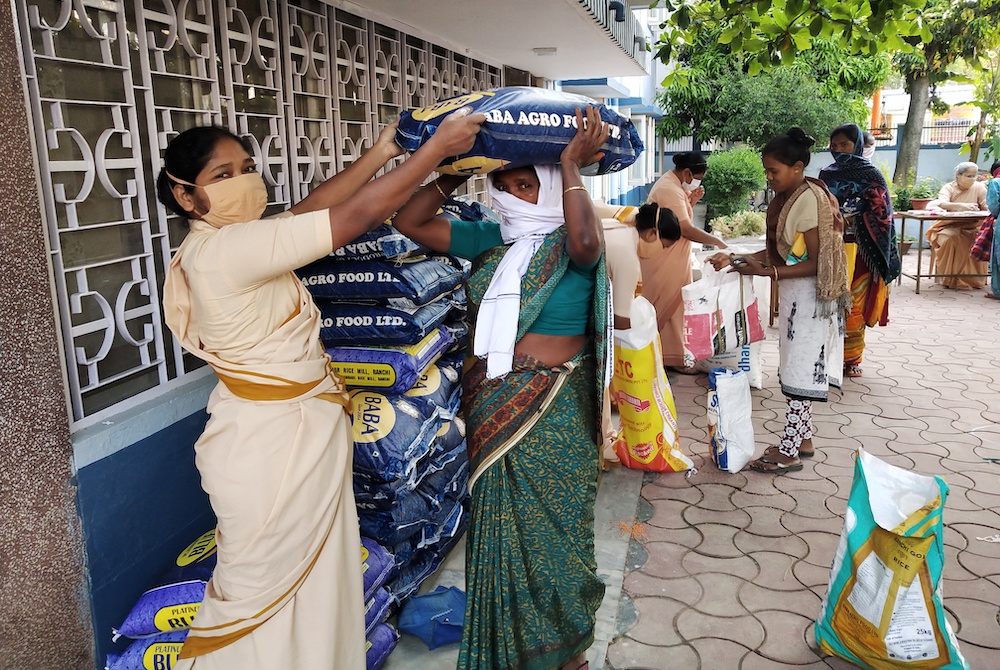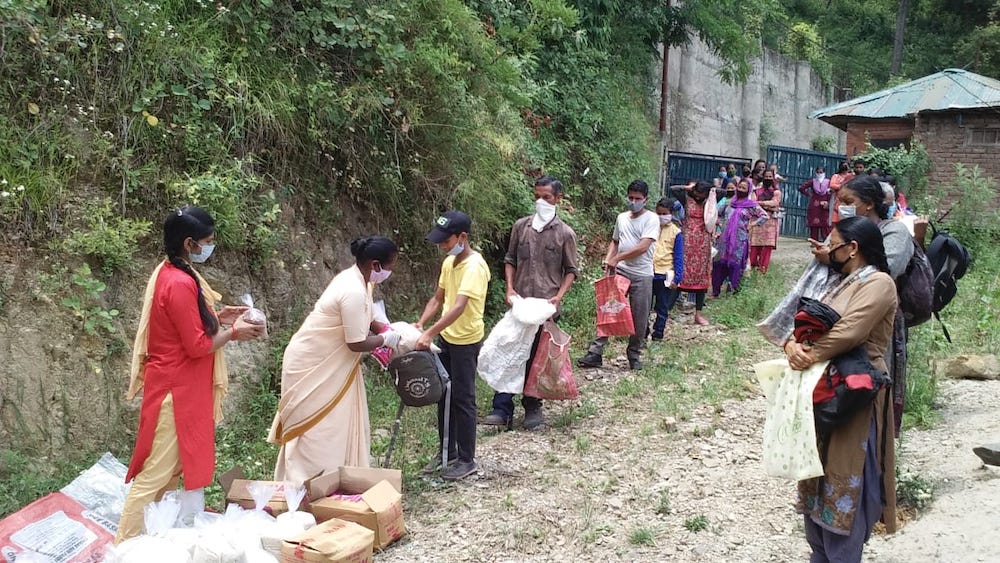
Sisters of the Little Flower of Bethany distribution of provisions in Jharkhand, India, during the coronavirus pandemic. (Courtesy Women's Religious Conference India)
Editor's note: As part of our Coronavirus: A Year Later coverage, we invited leaders of women's congregational associations to reflect on how the pandemic has affected religious life in their regions. Some provided overviews; others focused on their individual congregations as emblematic of shared experience. This entry is from the National Conference of Religious Women, India.

(NCR, GSR logo/Toni-Ann Ortiz)
The COVID-19 pandemic has changed the world, turned it upside down. It has brought revolutionary changes in almost every aspect of life. Masks have become an essential part of clothing. Traditional greetings like handshakes and hugging are replaced with physical distance. Sanitizers have become an essential household commodity. Classrooms are replaced by virtual platforms. Thus the impact that this present pandemic has brought about is unprecedented and difficult to gauge. COVID-19 has offered many opportunities to start new life — new ways of relating to God, to fellow human beings and to the cosmos. Calamity of this proportion necessarily calls for a metanoia, a definite move from an exilic existence to the Lord's peace.
COVID-19 has also made a tremendous impact on religious life. There is a new realization that God is the source of our life and is in control of everything. Our sense of pride and self-sufficiency is shattered. An attitude of surrender to God is being fostered. A commitment to live a more intense spiritual life, a deeper sense of our sinfulness and the need of intercession for the suffering world is keenly felt. Virtual Mass and the absence of the eucharistic celebration in person has increased our appreciation for the celebration of Mass and sacraments and made us long for spiritual experience. Personal responsibility has been taken to grow in faith, hope and love, spending extra time in prayer, attending online retreats and renewal programs.
The pandemic has been a time of grace, introspection and conversion. There has been a shift from our mechanical way of life, to live a more meaningful and purposeful life. It has made us resilient to cope with hardships and uncertainties with a stronger faith. Being active in diverse ministries for building up God's kingdom had been the focus. The pandemic was a call for us to slow down, to stop, to reflect, to interpret reality from God's point of view. It was an opportunity to revisit and to reorient our life and mission from God's perspective. Some responded to the pandemic through studies, writing and online training programs, making the best use of the time for updating and spiritual revival.
Advertisement
Indeed, it was an opportunity to deepen relationships in the community for an effective witnessing in our mission. Religious communities had quality time to strengthen the bond of unity, with greater openness to one another. Concern for the elderly community members, mutually supporting each other, and spending time with one another have been boosted. We have realized the need for interconnectedness and unity in facing problems of a global impact jointly and unitedly.
COVID-19 has taught us to adapt new ways of learning, teaching, communicating and working from home. Our travels, gatherings, prayers and celebrations, materialistic pleasures, deadlines to be met, targets to be achieved are brought to a standstill. Our world has become a world without walls, without boundaries, bringing us down to one common denominator. Coronavirus is a sign from God, to remind us that it is time for us to meet the challenge to be what we are called to be, a sign and sacrament of God's loving presence to humankind.
We need to applaud and appreciate the medical fraternity for their dedication and sacrifice at the risk of their own lives. The response of the sisters serving in hospitals, health and social work centers who reached out to thousands is commendable. Personal responsibility for taking care of our health using home remedies and doing physical exercise is better understood. We have opened our eyes to the importance of daily meditation, steam inhaling and proper diet to maintain immunity. Even those who were negligent have started taking the precautionary steps including special drinks, medicines and fruit. Earlier, a community member having a severe fever or a cold would not have been even noticed by others. But today, it is enough that someone sneezes and we notice it and attend to the issue.

Sisters also reached out to help migrants. Sisters of the Little Flower of Bethany distribute provisions to migrants in Himachal Pradesh, in the north India (Courtesy Women's Religious Conference India)
The limitations of science, the powerlessness of states and the fragility of humans is brought home to us. The lockdown has affected adversely the poor, especially women, migrants and refugees. We reached out to the needy, remembering that God is the God of the destitute, the poor, and the wronged, that we are all interconnected and need each other. God's Word fills us with new hope, calls us to action, with new opportunities to serve and to witness very practically to Christ's love. Religious have discerned, have reviewed their call and their mission to be at the service of those on the peripheries. It has resulted in better collaboration with the dioceses, other religious congregations, people of good will, government agencies and non-governmental organizations in relief work.
The pandemic has impelled a new way of living and coping with the crisis. Individuals and religious institutions have risen to the occasion and gone to the streets to help with various outreach programs especially aimed at the poor, stranded migrants and labor class. Religious orders in India have provided provisions to over 500,000 families and food to over 600,000 persons and nearly 300,000 families. We have made and distributed free masks to 640,000 people, sanitizers to nearly 250,000 people as per the statistics a few months ago. Several religious orders have placed their school or college buildings at the disposal of the government for isolation purposes or quarantine. The main beneficiaries have been slum-dwellers and the jobless poor, the rickshaw-drivers, construction workers, scavengers, domestic workers, street children and those who are mentally or physically challenged, as well as police personnel, doctors, nurses and paramedics. Counseling has been a powerful way of reaching out to those in distress and to the ailing.
Sisters in India are helping to provide health care. The Sisters of the Little Flower of Bethany assist in a health center in Naini, a twin city of Allahabad, India. (Courtesy of the Women's Religious Conference India)
In the face of financial crunch, we feel renewed urgency for responsible judicious financial planning. Hence we will continue to be modest in our celebrations, simple in infrastructure and minimize our requirements. We have allocated reasonable portions of our income toward charity, supporting people living in poverty, minimizing our expenditures and living a simpler lifestyle in solidarity with the poor.
COVID-19 should certainly be overcome. But it is our hope that the lessons learned, introspections made, repentance undertaken, transformation achieved, good decisions made, effective spiritualities practiced, and the love and concern shown during the COVID-19 pandemic will continue forever.







